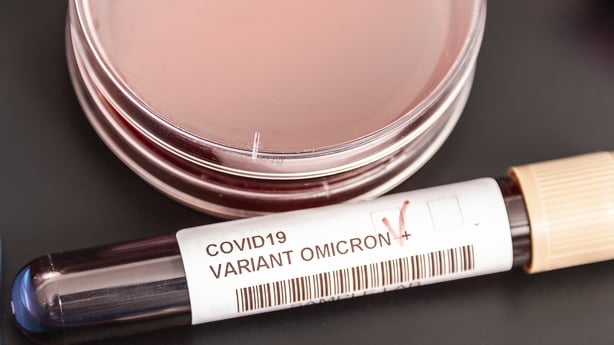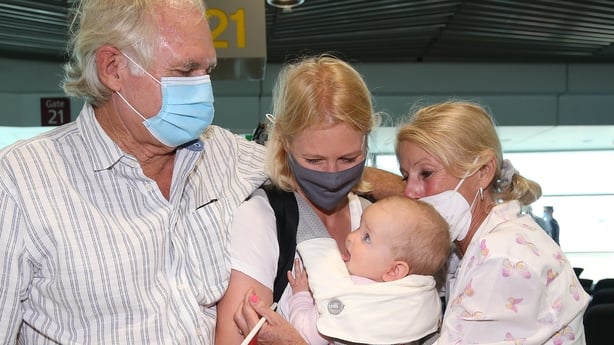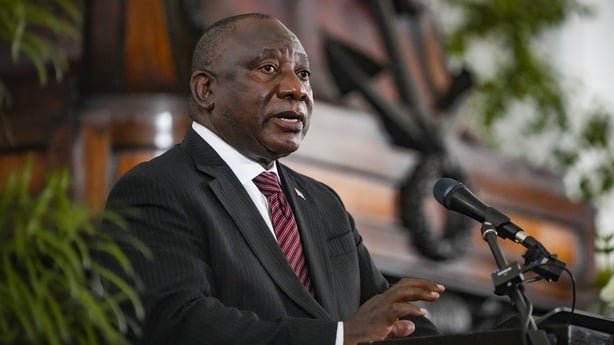Norway will further tighten restrictions and speed up vaccination in a bid to limit an expected surge of the Omicron variant of the coronavirus, Prime Minister Jonas Gahr Stoere said today.
Presenting its fourth round of measures in two weeks, the government announced a ban on serving alcohol in bars and restaurants, a closing of gyms and swimming pools to most users and stricter rules in schools, among other things.
"There is no doubt - the new variant changes the rules. That's why we need to act fast and we need to act again," Mr Stoere told a news conference. "For many this will feel like a lockdown, if not of society then of their lives and of their livelihoods."
The UK recorded the first publicly confirmed death globally today from the swiftly spreading strain.
Norway's new restrictions could cast doubt on the central bank's plan to raise interest rates later this week, DNB Markets said. The crown currency weakened by 0.9% during the day as news of the new measures emerged.
To speed up vaccination with booster doses, the government said the armed forces, as well as pharmacies, would assist in the inoculation campaign.
At the same time, quarantines would apply more widely, the government added.
Norway is setting record highs both in terms of new Covid-19 infections and hospitalisations, partly due to the spread of Omicron, which is expected to become the dominant variant in the coming days.
"A lack of action now could lead to large negative consequences for society, not just for health services and municipalities," the Norwegian Institute of Public Health (FHI) said.
Unless effective measures were established, the nation of 5.4 million people risks having between 90,000 and 300,000 new Covid-19 cases on a daily basis from early January, the FHI added.
Omicron expected to be dominant Covid variant in Denmark this week
Omicron is expected to become the dominant coronavirus variant in Denmark this week, with new daily cases reaching around 10,000, the country's Serum Institute said today.
The institute has detected 3,437 Omicron cases since it was first detected in Denmark on 22 November.
Danish health authorities said a third dose of the Covid-19 vaccine would be offered sooner to everyone over 40 to curb the spread of Omicron.
"Due to the new and more contagious Omicron variant the Danish Health Authority has decided to push the third jab for everyone aged 40 and above, so they get the vaccine four and half months after the second jab," the health authority said in a statement.
By reducing the interval of the doses, "we will be able to enter the winter with better protection for those at increased risk of severe disease and increased immunity in the population," director Soren Brostrom said.
A third dose is "safe and effective" as soon as three months after the initial vaccine course, the European Medicines Agency (EMA) said last week.
Denmark also recorded a record number of new cases of Covid-19 today, with 7,799 confirmed infections in the previous 24 hours.
Over a week, the number of cases is also at its highest since the start of the pandemic at 46,189 cases, a jump of more than 50% compared to the previous week, according to data from Danish health authorities compiled by AFP.
Denmark is second worldwide only to Britain in confirmed cases of Omicron, with both countries having extensive sequencing of samples to detect variants quickly.
As of yesterday, 2,471 cases of Omicron had been identified in the Nordic country of 5.8 million people, where 80.6% of the population over five years old has already received two doses of the vaccine.
The Omicron variant appears to spread faster than the Delta variant, making vaccines less effective but causing less severe symptoms, the World Health Organization said yesterday, while stressing that the data remains patchy.
In response to the surge in cases, Denmark reintroduced new restrictions last week, closing schools and colleges, curtailing nightlife and promoting remote working.
Footballer Kimmich regrets being undecided about vaccine
Bayern Munich's Joshua Kimmich said he regrets not making the decision to get a vaccine sooner after the midfielder was ruled out until January due to lingering effects of the coronavirus.
Kimmich, who has returned to light training but is struggling with minor lung issues after contracting Covid-19 in November, said last week he would miss the remainder of the year.
"Broadly, it was just difficult for me to deal with my fears and concerns, and that's why I remained undecided for so long," Kimmich told ZDN.
"Maybe I had to go through what I have now gone through first. Of course, looking back, I would like to make the vaccination decision earlier, but at the time it wasn't possible for me."

Kimmich revealed in October he was unvaccinated and the club came out in support of the player, a move that triggered a storm of criticism across Germany.
Kimmich said he understood the criticism that was directed his way but that some of it went too far.
"I have to say personally that some of the limits have been exceeded," the 26-year-old said.
"I also had the feeling that there was one or the other who tried to distinguish themselves through this situation. It wasn't always just objective criticism."
Bayern, who are six points clear in the Bundesliga, travel to face Stuttgart tomorrow.
Omicron poses "very high" global risk but data on severity limited - WHO

The Omicron coronavirus variant,reported in more than 60 countries, poses a "very high" global risk, with some evidence that it evades vaccine protection but clinical data on its severity remain limited, the World Health Organization said.
Considerable uncertainties surround Omicron, first detected last month in South Africa and Hong Kong, whose mutations may lead to higher transmissibility and more cases of Covid-19 disease, the WHO said in a technical brief issued yesterday.
"The overall risk related to the new variant of concern, Omicron, remains very high for a number of reasons," it said.
"And second, preliminary evidence suggests potential humoral immune escape against infection and high transmission rates, which could lead to further surges with severe consequences," the WHO said, referring to the virus' potential ability to evade immunity provided by antibodies.
The WHO cited some preliminary evidence that the number of people getting reinfected with the virus has increased in South Africa.
While preliminary findings from South Africa suggest that Omicron may be less severe than the Delta variant - currently dominant worldwide - and all cases reported in the Europe region have been mild or asymptomatic, it remains unclear to what extent Omicron may be inherently less virulent, it said.
"More data are needed to understand the severity profile," it said. "Even if the severity is potentially lower than for the Delta variant, it is expected that hospitalisations will increase as a result of increasing transmission.
More hospitalisations can put a burden on health systems and lead to more deaths."
More border rules ease in Australia ahead of Christmas holidays
Coronavirus-free Queensland state has opened its domestic borders to all vaccinated people for the first time in nearly five months, as Australians gear up for quarantine-free travel across most of the country during the busy Christmas period.
Hundreds of cars queued up at the state's southern border with New South Wales well before the rules were set to relax at 1 am local time, television footage showed.
Queensland, Australia's third most populous state, shut its border to New South Wales in July and then later to people coming from Victoria to protect against a Delta outbreak that rocked the country's east for several months.
"We will live with Covid - but on our terms," state Premier Annastacia Palaszczuk said in a tweet as the state topped its goal of having 80% of people over 16 fully vaccinated – a prerequisite for relaxing rules.
Qantas said it would fly nearly 10,000 passengers to and from Queensland today in about 100 flights, with most fully booked.

The easing of border restrictions comes just days before school summer holidays begin and will be a boost for the state's lucrative tourism sector which has been badly hit by the internal border curbs.
Australian states have been relaxing border rules after reaching higher vaccination levels despite the threat from the Omicron variant.
Tasmania is set to reopen its borders to other states later this week, while Western Australia will announce its plans later today. South Australia has been welcoming interstate arrivals since late November.
Australia has recorded nearly 229,000 cases of Covid-19 and 2,104 deaths, far fewer than many comparable countries.
Around 70 cases of the Omicron variant have been detected in the country so far, mainly in Sydney.
South African President Ramaphosa positive for Covid-19
South African President Cyril Ramaphosa has tested positive for Covid-19 and is receiving treatment for mild symptoms, the presidency said in a statement.
Mr Ramaphosa, who is fully vaccinated, began feeling unwell after leaving a state memorial service for former deputy president FW de Klerk in Cape Town earlier in the day, but was in good spirits and being monitored by doctors, it said.
The highly mutated Omicron variant was first detected in South Africa last month and sparked global panic over fears that it is more contagious than other variants.
Mr Ramaphosa will remain in self-isolation in Cape Town for the time being and has delegated all responsibilities to Deputy President David Mabuza for the next week.
On a recent visit to four West African states, the president and the entire South African delegation were tested for Covid-19 in all countries, the statement said.

"The president and the delegation returned to South Africa from the Republic of Senegal on Wednesday, 8 December 2021, after obtaining negative test results.
"The president also tested negative on his return to Johannesburg on 8 December."
The statement quoted Mr Ramaphosa as saying that his own infection served as a warning to all citizens of the importance of getting vaccinated and remaining vigilant against exposure.
"Vaccination remains the best protection against severe illness and hospitalisation," the statement said.
"People who have had contact with the president today are advised to watch for symptoms or to have themselves tested," it added.
Despite cases of Omicron being found in countries worldwide, it has not yet become fully clear if it causes more severe illness or if, or to what it extent, it can evade vaccines.
In a tentative judgement, the EU Medicines Agency said on Thursday that Omicron may cause milder disease after the WHO said earlier in the week that there was some evidence that Omicron causes less severe disease than Delta, the currently dominant variant.
Thailand to expedite Covid-19 boosters in anticipation of Omicron
Thailand will halve to three months the time between administering a second Covid-19 vaccine shot and a booster, a health official said today, to try to strengthen immunity in anticipation of a local spread of the Omicron variant.
Thailand has so far detected eight imported cases of the Omicron variant but has yet to see community transmission, according to its health ministry.
Omicron has been reported in dozens of countries.
"Because Omicron is now widespread, the booster third shot would help lessen the severity of symptoms and reduce the death rate," said Taweesin Visanuyothin, spokesperson for the government's Covid-19 task force.
Mr Taweesin said recipients of a second shot in August or September could get boosters right away at any vaccine centre nationwide.
More than 43 million (60%) of people in Thailand have received two doses of a Covid-19 vaccine, of which 4.1 million have received boosters.
France warned of 'sixth wave'
A leading French hospital executive has warned that the country will be hit by a sixth Covid wave next month due to the emergence of the Omicron variant.
The warning comes as the country is still in the midst of the current, Delta-fuelled, fifth wave of the pandemic.
"We haven't said a word on the sixth wave, which is Omicron, which will come later, in January", said Martin Hirsch, head of Paris's AP-HP hospitals group, Europe's largest hospital system.
British Prime Minister Boris Johnson warned yesterday that the UK was facing a "tidal wave" of the Omicron variant of coronavirus and that two vaccine doses would not be enough to contain it.
China reports first Omicron case
China has reported its first case of the fast-spreading Omicron coronavirus variant, state media said today.
Authorities in the northern city of Tianjin confirmed the case in an individual who entered the country from an undisclosed overseas location, according to the Tianjin Daily newspaper.
The asymptomatic patient tested positive for Covid-19 on Thursday before further tests "confirmed the detection of the... Omicron variant", the report said, adding that the person was being treated in isolation at hospital.
The world's most populous nation is on high alert for potential outbreaks as it prepares to host the Beijing Winter Olympics in February.
China has slowed its number of new virus cases to a trickle through a combination of tight border restrictions, mass testing and targeted lockdowns.
The country recorded 101 new Covid-19 cases today, including 21 imported infections, according to data from the National Health Commission.

